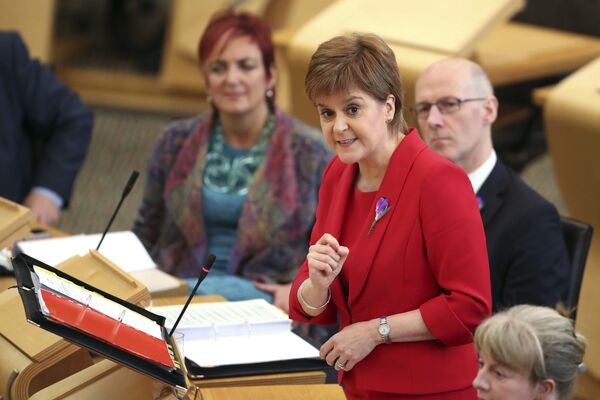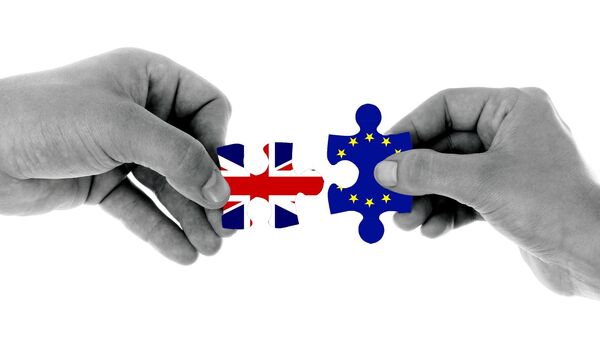The Scottish Center on European Relations at Queen's University in Belfast has published a research paper on the impact of Brexit on Northern Ireland and Scotland.
New Report: ‘The two remain-voting areas of the UK face being hard-hit by Brexit’. Check out report on Northern Ireland and Scotland from Scottish Centre for European Research @SCER_eu #Brexit https://t.co/8SaTeetagk
— Angus Robertson (@AngusRobertson) April 24, 2018
The governments' policies on Brexit, issues of independence and free economy, as well as the question of devolution are discussed by the paper's authors Dr. Kirsty Hughes and Dr. Katy Hayward.
Brexit Policy Peculiarities
There are a number of delicate specifics considered by politicians in Edinburgh when they press for decisions on Brexit policies in Westminster. Soft is the Brexit type of choice for Scottish nationalists (SNP), whose leader and First Minister of Scotland Nicola Sturgeon voiced concern over leaving the EU without a free trade deal. It would cost Scotland about £12.7 billion a year by 2030, according to the analysis revealed in the beginning of 2018.
Full @nicolasturgeon speech on Scotland's Place in Europe: People, Jobs and Investment now available #ScotEu https://t.co/SuoFGAxmgU pic.twitter.com/rEhheGlow8
— Scottish Government (@scotgov) January 15, 2018
In her speech at the 2017 SNP party conference, Sturgeon stressed the party will always make the case for independence, while Scotland should have the right to choose its future "when the terms of Brexit are clear." Half a year later and the terms of the UK leaving the European bloc are still unclear.
Following the Brexit vote, public support for independence in Scotland has diminished compared to the 2014 poll results.
According to the authors of the paper, "there is awareness — if not admitted publicly — that a hard Brexit creating a hard UK-EU border will also make independence trickier, since it would be likely to imply a hard England-Scotland border."
"And a future choice between EU or EEA membership for an independent Scotland — and debates over this — would, because of Brexit, have to take into account the impact of such policy choices on the border with the rest of the UK. If the UK did shift tack to stay in a custom's union with the EU, that would impact on any future independent Scotland's EU versus EEA choice."
When it comes to Belfast's preferences on Brexit policies, there are even more complications and uncertainty. The two main political parties — the Democratic Unionists (DUP) and Sinn Fein — are pursuing different agendas, which include a closer alliance with London and potentially a united Ireland.
READ MORE: Brexit's Your Mess, Fix the Irish Border Issue or No Deal — Donald Tusk Tells UK
According to Dr. Hughes and Dr. Hayward, given the dichotomy and the "concentration on the DUP and Sinn Féin in the talks rather than on the center ground parties – there is a concern that there will be little progress made on Brexit policy even if a power-sharing executive is restored."
Northern Ireland has been without a devolved government for over a year, since the power-sharing arrangement crashed in 2017.
The researchers note that the EU and Britain have agreed in principle that Irish citizens in Northern Ireland should retain their EU citizenship rights after Brexit.
"Given that people born in Northern Ireland are automatically entitled to Irish citizenship, this puts them in quite a different position to those in Scotland. Anecdotal evidence would suggest that new applications for Irish passports have come from staunch unionists (included among whom is one Ian Paisley Jr.) as well as nationalists. This is a demonstration of pragmatism rather than identity change," the academics argue.
Power Grab
The issue of access to devolved powers following Brexit has driven a wedge between Westminster and local governments across the UK. The SNP have accused the Conservative government in London of trying to grab the powers, "like support for farmers or control of our seas" that are exercised at an EU level and are subject to EU law via the EU Withdrawal Bill.
READ MORE: Brexit Driving a Wedge Between London and Local Governments

To prevent this, the Scottish government introduced a Scottish EU Continuity Bill, against which Westminster has launched court action to quash the Bill in the Supreme Court.
Despite assurances from British Devolution Secretary David Lidington that Scotland, Wales and Northern Ireland will exercise the vast majority of powers currently held by Brussels, dealing with areas such as carbon capture, management of energy and water quality, the local government leaders have blamed the Tories of attempting to undermine devolution and recentralizing power.
READ MORE: Regional UK Leaders Meet Prime Minister to Discuss Post-Brexit Powers
Due to absence of a Northern Ireland executive and assembly, Belfast has been under-represented in debates over a return of EU powers in devolved areas and the creation of new common frameworks, say the academics of the Queen's University in Belfast.

